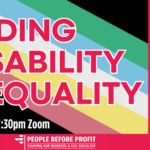The programme for government (PfG) is a bad deal for workers. It does not reflect the vote for change in the election. Nor does it reflect the huge support for frontline workers expressed during the Covid-19 Crisis. There is huge support for the idea that there is no going back. No going back to poor public services. No going back to low levels of workers’ rights and low levels of social protection.
So what’s wrong with the programme? There are many faults with the programme but here are some specifics which will directly affect workers.:
- There is no provision for union recognition. Employers will still not have to deal with unions even when worker join a union the employer won’t have to deal with it. There is also no provision for access to workplace for unions which might have improved workers safety during the Covid 19 crisis.
- There is no provision for equal pay for new entrants to the public service. Young teachers will still be paid less than teaches who started before 2011. Both FF and the Greens say the support equal pay.
- There is no provision for mandatory sick pay. Despite the Covid 19 crises exposing the low level of sickness benefit here no change is proposed. Workers here in the private sector must wait for 6 days (the average in the EU is 3) before being paid anything in state benefit. Further, only Ireland, Malta and the United Kingdom apply a flat rate amount in state benefit. Replacement levels (the amount of your earnings covered) by the benefits in Ireland is estimated at around 36%, the third lowest in the EU. The rate now is €203 per week. At a minimum it should be the €350 paid to those on Covid related sick leave.
- The PfG says there will be “Progress to a living wage over the lifetime of the Government”.
Thus even at the end of five year we may still not have reached a Living Wage. Ireland will still have high levels of low pay. We are currently third highest in the OECD.
On the next page it says:
“The Low Pay Commission will be instrumental in ensuring that those who are in low-paid
employment are valued. We will be guided by the recommendations of the Low Pay Commission with regard to any future changes in the minimum wage.”
To date this body has not seen fit to recommend a Living Wage. For Ireland the living wage rate for a single adult was estimated at €12.30 per hour in 2019, 22% more than the Minimum Wage. Due to the high cost of housing a recent Eurofound report estimated that the living wage rate for a single adult in Dublin would be €14.45 per hour, while for a single adult with one child this would climb to €17.15. This suggests that a rate of €12.30 would leave workers struggling to meet living costs especially in Dublin. This is why workers need a Living Wage of €15 an hour now.
- There is no protection for workers made redundant through liquidation like those in Debenhams. Its says the new government will
“Review whether the legal provisions surrounding collective redundancies and the liquidation of companies effectively protect the rights of workers”
The answer to the question here is a simple NO. We know this already. We have already had the review. It’s called the Duffy Cahill Report and was conducted in 2016 after the Clerys closure. There is already a Sinn Fein bill which addresses the issue which fell at the dissolution of the Dail. So why another review?
- Workers will pay more PRSI. The PfG says
“As the economy recovers and employment grows, request the Commission on Welfare and
Taxation to examine what changes can be made to employer and employee PRSI to improve
existing benefits and provide additional.”
A persistent problem here is that employers pay very low rates of PRSI compared to comparator countries. Payments here are about 49% of the average. But employee PRSI is 98% of the average. So why seek to increase PRSI rates for both. The intention to do so was confirmed by the Irish Times of June 17th. The social wage needs to be increased but employers should be paying more to fund it.
- Workers will pay more tax. The PfG says
“We will utilise taxation measures, as well as expenditure measures, to close the deficit and fund public services if required. In doing so, we will focus any tax rises on those taxes which tax behaviours with negative externalities such as carbon tax, sugar tax, plastics, etc.” These taxes will impact most on working people and the poor and like all consumption based taxes are inequitable. There are no substantial proposals to tax wealth or profits.
- Public sector workers will be squeezed again. PfG wants a new public pay deal. The approach will “be guided by the State’s financial position and outlook” and “will ensure that there is an emphasis on embedding positive work practice changes that have emerged due to the COVID-19 Emergency as well as general productivity gains and effectiveness based on measurable outcomes”. This means more work for everybody. We are still working additional hours foisted on us during the financial crisis. A generalised move to online working is not something that can be welcomed. Many public-sector workers are struggling with increased workloads, childcare issues and difficulty of separating home and work lives.
- And what if you get laid off which many will be over the next few months
The commitment is to “Protect core weekly social welfare rates” and “improve jobseeker supports for people aged under 24 over the lifetime of the Government”.
In light of Covid 19 these need to be increased with the €350 as a benchmark for all Jobseekers including those under 24.
Current rates leave many workers in poverty when they are made unemployed. The following table shows how far below the poverty line current payments are.
| Category | Weekly Payment (€)* | Poverty Line (€) | Difference (€) |
| Single Person | 203Under 25 113 | 284284 | 81171 |
| Couple | 338 | 472 | 134 |
| Couple +2 Children | 418 | 659 | 241 |
| Couple + 3 Children | 458 | 754 | 296 |
| One Parent + 1 Child | 243 | 378 | 135 |
| One Parent + 2 Children | 283 | 472 | 189 |
| *Based on getting full rate and full child allowance for each child |
10. The pension age is not going back to 65












